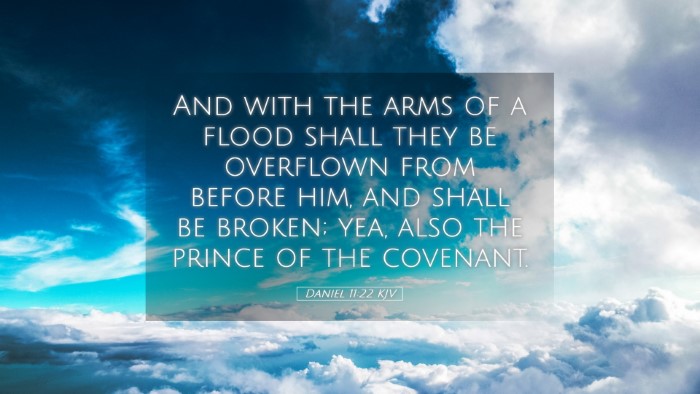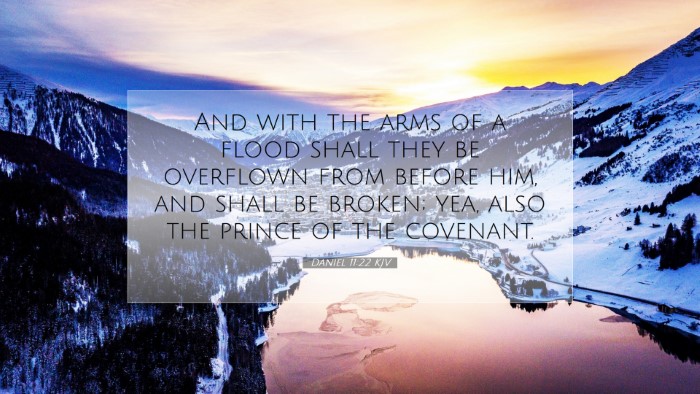Commentary on Daniel 11:22
Daniel 11:22 serves as a pivotal verse within the prophetic filled chapter of Daniel, which outlines the succession of empires and significant historical events leading up to the end times. In this analysis, we will draw insights from several public domain commentaries to better understand its implications.
Text of Daniel 11:22
"And with the arms of a flood shall they be overflown from before him, and shall be broken; yea, also the prince of the covenant."
Historical Context
This verse falls within the larger context of the prophecies regarding the kings of the North and South, representing the Seleucid and Ptolemaic empires, respectively. The prophecy is laden with symbolic language that reflects the intense political intrigue and constant conflict of the 2nd century BCE.
Insights from Commentaries
This analysis will summarize insights from reputable commentaries such as those by Matthew Henry, Albert Barnes, and Adam Clarke:
Matthew Henry’s Commentary
According to Matthew Henry, the "arms of a flood" symbolize overwhelming forces that will devastate the opponents of the covenant. He interprets this as a representation of sudden and destructive invasions by mighty armies. Henry notes that the phrase “shall be overflown” indicates a surprise attack that leads to the total submersion of rival powers, which points towards the swift and overpowering military actions that characterize the historical narratives he references. Furthermore, Henry highlights that the "prince of the covenant" likely refers to those in authority over the people of God, emphasizing the spiritual dimension involved in this prophecy.
Albert Barnes’ Notes
Albert Barnes elaborates on the phrase "the arms of a flood," suggesting that it conveys the notion of a powerful and overwhelming force that would inundate its adversaries. He emphasizes that such descriptions suggest a sudden and aggressive military advance that will cause great loss and destruction. Barnes interprets "the prince of the covenant" as a specific leader of God's people who would face great tribulation. He elucidates that this term can refer to both Joshua the high priest and to the coming Messiah, indicating the dual application of the prophecy. This emphasis on leadership and authority sets the context for understanding the challenges faced by the covenant community during this tumultuous period.
Adam Clarke’s Commentary
Adam Clarke offers a scholarly perspective, examining the implications of this verse in the broader narrative of the Book of Daniel. He suggests that the "flood" metaphor represents both literal and figurative overflowing powers — armies and empires rising against one another. Clarke explores historical applications where such calamities engulf nations, assessing their ramifications on the covenant community. He observes that the breaking of "the prince of the covenant" could refer to the crushing impact of political upheaval on the faithful, leading to distress and hardship for the people of God. Therefore, Clarke contextualizes the verse as one intertwined with both the historical and the eschatological, engaging readers in an exploration of God’s ultimate sovereignty over history.
Theological Implications
Collectively, these commentaries highlight crucial theological dimensions encapsulated within Daniel 11:22. It suggests a profound assurance in God’s sovereignty amidst chaotic and violent political landscapes. The predictions of military defeat serve as a reminder to the faithful that God is aware of the struggles of His people and is instrumentally involved in the unfolding of history.
- Sovereignty of God: Each commentator points to God’s ultimate control over historical developments, affirming that His plans supersede human efforts.
- Hope for the Faithful: The persecution and trials faced by God’s people, symbolized by "the prince of the covenant," underscore the hope that exists for the faithful, even in dire circumstances.
- Messianic Anticipation: The role of the "prince of the covenant" extends beyond historical implications, as it anticipates the coming of Christ, the ultimate covenanter who brings lasting peace.
Conclusion
In summary, Daniel 11:22 encapsulates the tumultuous historical milieu surrounding the Jewish people during the Seleucid and Ptolemaic conflicts while delivering a timeless theological message. The insights gleaned from Matthew Henry, Albert Barnes, and Adam Clarke provide critical perspectives that enrich our understanding of scripture. By affirming God’s sovereignty, portraying the hardships of His people, and looking forward to the ultimate fulfillment in Christ, this verse remains a poignant reminder of God’s enduring covenant relationship with His people.


